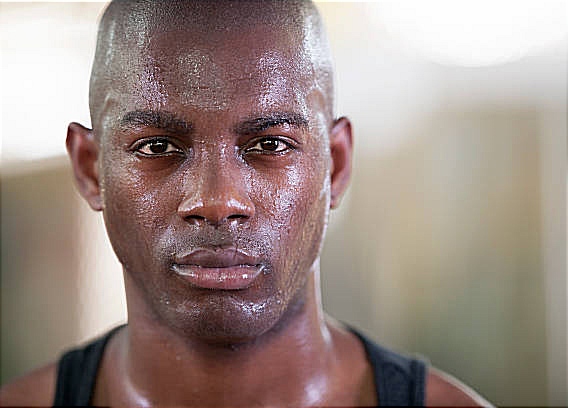Have you experienced a situation where everyone around you is looking okay, and you are the only one sweating? Or you have seen someone sweating in an air-conditioned room. What came to your mind when you experienced it or when you saw that person? Did you think something was wrong or it appeared funny?
Sweating is a normal body function which helps control your body temperature by releasing salt-based fluids from your sweat glands. We sweat regularly in our armpits, face, groin, palms of the hands and soles of the feet.
Sweating is an essential part of our existence, and it happens unconsciously (you cannot control when and how you sweat). Have you ever imagined what would happen if you do not sweat? Then, you would experience what is called overheating, since sweating helps manage your body’s temperature.
Sweating occurs as a cooling mechanism in response to your body’s increased temperature. When there is heat, or after exercise, your body’s temperature increases. Sweat is released via skin ducts to moisten your skin surface and as it evaporates, it cools you down.
What causes sweating?
Sweating occurs as a result of changes in the environment; change in the normal functioning of your body; and bodily inconvenience. Situations that stimulate sweating include:
• High temperature
• Emotions like fear, anger, shock, embarrassment
• Stress
• Exercises
• Hormonal changes in teenagers
• Bodily inconvenience like when you want to use the toilet
• Foods taken when hot or spicy
• Some medications
• Fever
Hyperhidrosis means excessive sweating. This occurs when sweating is not triggered by increased temperature, physical activity, or bodily inconvenience. Some people sweat excessively even in cool and normal situations which causes embarrassment and discomfort.
People who experience hyperhidrosis can also experience situations as normal people that will make them sweat, but even without the situations, they still sweat excessively.
It is majorly hereditary and people who experience them cannot pinpoint the exact cause (primary cause). Other times, a disease condition is responsible for excessive sweating (secondary cause).
Diseases and conditions that make one prone to hyperhidrosis include obesity, gout, tumour, ingestion of poison, mercury poisoning, hyperthyroidism, and diabetes.
This hyperhidrosis affects the lifestyle, career choices, self-esteem and image, emotional well-being and recreational activities of people who experience them.
Signs and Symptoms

• Persistent sweating even in cool situations.
• Visible sweats that wet clothing
• Sweaty palms of the hands and soles of the feet.
Concerns and Issues
The experiences that give concern to people experiencing hyperhidrosis

• Self consciousness
• Social withdrawal. They prefer staying on their own than interacting with others
• Bothersome skin issues like fungal and bacterial skin infections
• Spend a considerable amount of time dealing with sweats.
• Physical contact with other people becomes a concern
• Prefer carrying out activities and choose jobs that do not require much physical contact.
It is important to note that excessive sweating is not common during sleep for people with primary hyperhidrosis.
Lifestyle Modifications
Changes in daily activities and lifestyle may help enhance symptoms.
• The use of antiperspirants.
• Wearing loose clothing that is breathable.
• Avoid synthetic fibre clothing like nylons.
• Making use of armpit shields to protect clothes from sweats.

• Avoid shoes with synthetic materials. Go for leather shoes
• Mentally develop yourself to not bother about how much you sweat.
• Wearing socks that absorb moisture in your shoes.
Treatment Options
There are also treatment options that assist people who sweat excessively (whose cause is unknown) but they are not fully harnessed probably due to ignorance, or they feel it is not necessary to get medical attention or they are embarrassed. The second hyperhidrosis is treated when the underlying disease conditions are properly treated or managed.
A skin specialist or dermatologist may be recommended to you by your doctor. After proper diagnosis, they may suggest:
• Iontophoresis which involves introduction of drug molecules by use of voltage gradient on the skin. The electric current allows permeability of the drug molecules into the skin.
• Botulinum toxin: Also known as Botox injections. They block the nerves that trigger sweats. For effective results, more than one injection.

• Anticholinergics: They are medications which inhibit the parasympathetic transmission of nerve impulses. Improvement is noticed within few weeks
• Endoscopic Thoracic Sympathectomy (ETS) is a surgical intervention where the nerves that carry impulses of sweat glands are cut. Recommended in severe cases and only in treatment of excessive sweating of the face, hands, and armpits.
FURTHER READING:
TALKING ABOUT EXCESSIVE SWEATING BY DR. ADEYEMO OLUSOLA
DANGERS OF PROLONG EXPOSURE TO THE SUN BY PHARM. NONYE

Ezike Nonye is a Pharmacist who completed her Bachelor degree from University of Lagos (B.Pharm). She is currently exploring digital marketing analytics as a novel field in Pharmacy practice while also interning at the Federal Medical Center (FMC) Abeokuta, Ogun State, Nigeria. She is a graphic designer, a blogger and an entrepreneur. She is passionate about creating new things from nature and believes that there is no limitation to what you can achieve. She is a Christian and loves writing and open to new ideas and skills.

